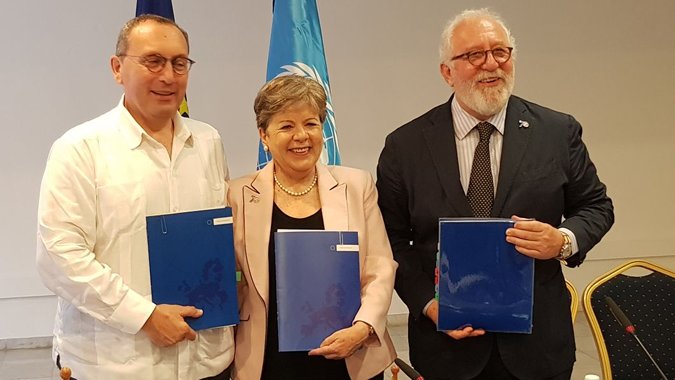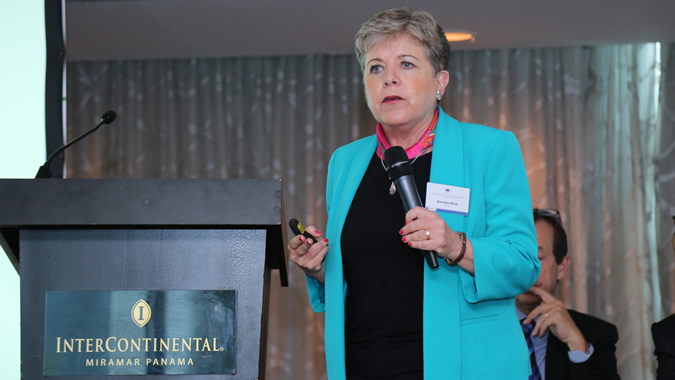European Union, OECD and ECLAC Sign Agreement to Facilitate the Development of Countries in Transition
The instrument was signed today in the framework of ECLAC’s thirty-seventh session, which is taking place through Friday, May 11 in Havana, Cuba.

The European Union (EU), with the support of the Development Center of the Organization for Economic Cooperation and Development (OECD) and the Economic Commission for Latin America and the Caribbean (ECLAC), signed today in Havana, Cuba a new tool that seeks to promote sustainable development in the region as countries make the transition to higher income levels.
The regional instrument known as the “Facility for Development in Transition,” which will provide help for the design and implementation of public policies to achieve the Sustainable Development Goals, was penned by Alicia Bárcena, ECLAC’s Executive Secretary, Stefano Manservisi, the European Commission’s Director-General for International Cooperation and Development, and Mario Pezzini, Director of the OECD’s Development Center, in the framework of the thirty-seventh session of ECLAC, which is being held through Friday, May 11 in Cuba.
“With this alliance we are proposing a Copernican leap forward in traditional development cooperation and we are doing so to be able to confront the new economic and social challenges faced by countries such as those in Latin America and the Caribbean,” Alicia Bárcena said during the presentation of the mechanism.
She recalled that, of the 33 countries that make up the region, 32 are considered to be middle income, meaning that they are on the path to development.
“We are going to initiate a process to change the conversation between those who provide and those who receive cooperation. This facility will allow us to have a different conversation with the Latin American and Caribbean countries that are in transition, with the countries of the European Union that have gone through these transitions, and to take models to other regions of the world,” she indicated.
Stefano Manservisi, meanwhile, stressed the importance of joint work to “give the world a new governance and a sense of cohesion that is sustainable.”
“Only by working together will we be able to achieve the highly important transformations that the world needs,” he added.
In his remarks, Mario Pezzini said that with the facility agreement, “we are building, a little at a time, the machinery that allows us to tackle a new system of international relations.”
“This agreement is testimony to the shared vision that recognizes the needs of middle-income countries and also those of low-income ones,” he stated.
The concept of development in transition has special importance in Latin America and the Caribbean, where the majority of countries are attaining higher income levels but continue grappling with structural challenges. These challenges are mainly related to inequalities, regional differences, the mobilization of domestic resources and the weakness of social frameworks, as well as with limited capacities for innovation and low levels of diversification.
In this transition process, while countries make efforts to address domestic vulnerabilities, they also face a new scenario full of risks on a global scale, which make it necessary to provide coordinated responses in regional and international spheres.
Through this instrument, the European Union will strengthen its collaboration with associated countries in Latin America and the Caribbean, as well as with multilateral organizations, to adapt and provide suitable help.
This tool will evaluate the way in which transitions to greater income levels can be favored by an improvement in strategic and regulatory capacities to achieve the 2030 Agenda for Sustainable Development. Furthermore, the instrument will put into practice experimental initiatives adapted to providing new responses to changing needs and challenges.
The European Union has allocated an initial amount of 9.5 million euros to the instrument, which will be combined with the resources contributed by ECLAC and the OECD’s Development Center to reach 16 million euros.
Related event
Thirty-seventh session of ECLAC
El período de sesiones es la reunión bienal más importante de la Comisión Económica para América Latina y el Caribe (CEPAL). Ofrece un foro que permite analizar temas relevantes para el desarrollo de…
Related content

The European Union launches the Regional Facility for Development in Transition
The tool was presented today in Buenos Aires, Argentina, by Stefano Manservisi, General Director of International Cooperation and Development of the European Commission, Mario Pezzini, Director of…

Thirty-seventh session of ECLAC
El período de sesiones es la reunión bienal más importante de la Comisión Económica para América Latina y el Caribe (CEPAL). Ofrece un foro que permite analizar temas relevantes para el desarrollo de…

Alicia Bárcena Calls for a New Narrative on International Cooperation for Latin American and Caribbean Development around the 2030 Agenda
During a seminar organized by the European Union in Panama, ECLAC’s Executive Secretary emphasized the role of international cooperation in supporting countries in transition.
Related link(s)
Country(ies)
- Latin America and the Caribbean
- European Union
Contact
Public Information Unit
- prensa@cepal.org
- (56 2) 2210 2040